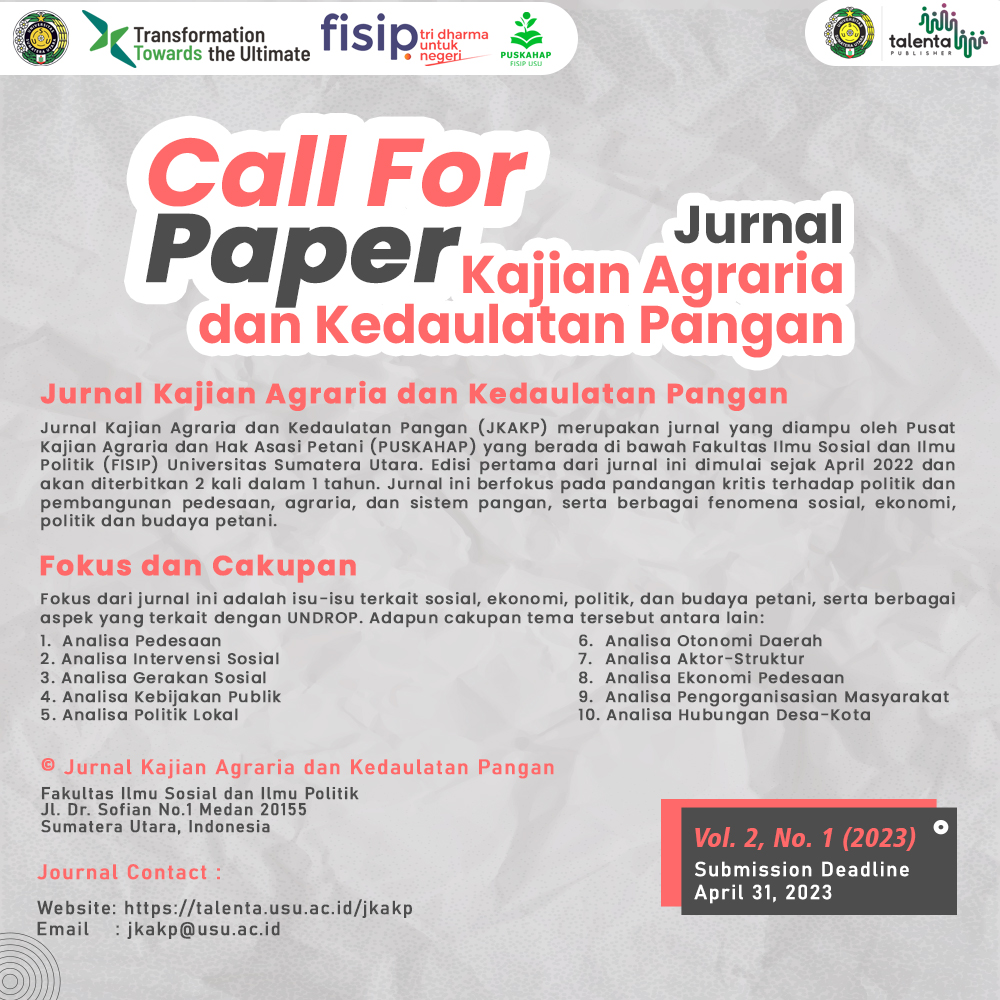Agrarian Conflicts Across Ugandan Societies: A Complex Struggle
DOI:
https://doi.org/10.32734/jkakp.v3i2.18938Keywords:
Agrarian conflict, Land Tenure, UgandaAbstract
Agrarian conflicts in Uganda are deeply embedded in the nation's historical, social, and economic contexts. Rooted in colonial-era land policies, such as the Mailo land system, these conflicts continue to shape land ownership and agricultural practices, contributing to socio-economic inequalities. This paper examines the causes and consequences of agrarian disputes in Uganda, focusing on land tenure disputes, ethnic and regional conflicts, government policies, population pressures, and the commercialization of agriculture. The study finds that historical land tenure systems, particularly the Mailo system, have created lasting inequalities, while modern governmental policies and population growth exacerbate land-related conflicts. Additionally, the shift towards large-scale commercial agriculture has marginalized smallholder farmers, contributing to social instability. Addressing Uganda’s agrarian conflicts requires a comprehensive and inclusive approach to land reform, incorporating stronger governance, sustainable land management, and respect for indigenous rights.
References
Acker, Frank Van. 2004. Uganda and the Lord’s Resistance Army: The New Order No One Ordered. African Affairs, 335-357.
Borras, J. S., & Franco, J. C. (2013). Global land grabbing and political responses ‘from below’. Third World Quarterly, 34, 1723–1747. https://doi.org/10.1080/01436597.2013.843845
Branch, A. (2011). Displacing human rights: War and intervention in Northern Uganda. Oxford: Oxford University Press. https:// doi.org/10.1093/acprof:oso/9780199782086.001.0001 Branch, A. (2013). Gulu in war…and peace? The town as camp in northern Uganda. Urban Studies, 50(15), 3152–3167. https://doi.org/10.1177/0042098013487777
Coninck, John de, Julian Culp, Viviene Taylor. 2013. African Perspectives on Social Justice. Kampala: Friedrich Ebert Stiftung.
Powell, Joe. 2010. Karamoja: A Literature Review. Safeworld.
Dahlberg, Annika. Rick Rohde, Klas Sandell. 2010. National Parks and Environmental Justice: Comparing Access Rights and Ideological Legacies in Three Countries.
Green, Elliot D. 2005. Ethnicity and the Politics of Land Tenure Reform in Central Uganda. Development DESTIN Studies Institue, 05-58.
Iriyani, Silfi, Muhammad Arman, Bramasto Nugroho, Damayanti Buchori, Fitta Setiajiati. Indigenous Custodianship and Timber Legality Assurance System: Challenges and Opportunities for Customary Forest Management in Indonesia. Jurnal Sylva Lestari, 12 (3) 929-947.
Isakson, S. R. (2017). Food and finance: The financial transformation of agro-food supply chains. In New Directions in Agrarian Political Economy (pp. 109-136). Routledge.
Jones, B. (2016). Beyond the state in rural Uganda. Edinburgh: Edinburgh University Press.
Kandel, M. (2017). Land conflicts and social differentiation in eastern Uganda. The Journal of Modern African Studies, 55(3), 395–422. https://doi.org/10.1017/s0022278x1700026x
Kandel, M. 2022. Customary Land Disputes and the Commoditization of Rural Land in Africa: A Case Study from Eastern Uganda. Journal of Contemporary African Studies, 40 (3), 370-383.
Levien, M., Watts, M., & Hairong, Y. (2018). Agrarian Marxism. Journal of Peasant Studies, 4(5–6), 853–883.
Mamdani, M. (2018). Class struggles in Uganda. Review of African Political Economy, 4, 26–61.
Mamdani, M. (2019). Politics and class formation in Uganda. New York and London: Monthly Review Press.
Martiniello, G. (2015). Social struggles in Uganda's Acholiland: Understanding responses and resistance to Amuru Sugar Works. Journal of Peasant Studies, 42(3–4), 653–669. https://doi.org/10.1080/03066150.2015.1032269
Martiniello, G. (2015). Food sovereignty as praxis? Rethinking the food question in Uganda. Third World Quarterly, 36(3), 508–525. https://doi.org/10.1080/01436597.2015.1029233 Martiniello, G. (2017a). ‘Don't stop the mill’: South African capital and agrarian change in Tanzania. Third World Thematics: A TWQ Journal, 1(5), 633–652.
Martiniello, G. (2019). Accumulation by Dispossession and Resistance in Uganda. Elsevier (Land Use Policy), 99 (C), 183–201. https://doi.org/10.1007/978-981-10-5840-0_9
Mugagga, Frank. 2012. Land Use Changes on the Slopes of Mount Elgon and the Implications for the Occurence of Landslides. CATENA, 90 39-46.
Mwanika, K., State, A. E., Atekyereza, P., & Österberg, T. (2020). Colonial legacies and contemporary commercial farming outcomes: sugarcane in Eastern Uganda. Third World Quarterly, 42(5), 1–19. https://doi.org/10.1080/01436597.2020.1783999
Nakayi, R. (2023). Weaponisation of trespass to land and its implications for land justice and enjoyment of property rights in neoliberal Uganda. Strathmore Law Journal, 7(1), 179–209. https://doi.org/10.52907/slj.v7i1.184
Nakayi, Rose, Monica Twesiime-Kirya. 2017. The Legal, Policy and Institutional Framework of Land Governance in Uganda: A Crirical Analysis. Kampala: Human Rights and Peace Centre.
Quan, Julian, Camilla Toulmin. 2004. Formalising and Securing Land Rights in Africa: Overview, Proceedings and Summary of Conclusions from the Land in Africa Conference Held in London, 75-88.
Salami, Adeleke, Abdul B. Kamara, Zuzana Brixiova. 2010. Smallholder Agriculture in East Africa: Trends, Constraints and Oppotunities. African Development Bank Group, 105.
Shuman, Eric, Siwar Hasan-Aslih, Martijn van Zomeran, Tamar Saguy, Eran Halperin. 2022. Protest Movements Involving Limited Violence can Sometimes be Effective: Evidence from the 2020 BlackLivesMatter Protests. Proc Natl Acad Sci USA. 199 (14).
Tatwangire, A., & Holden, S. T. (2013). Land Tenure Reforms, Land Market Participation and the Farm Size — Productivity Relationship in Uganda. Palgrave Macmillan UK, 187–210. https://doi.org/10.1057/9781137343819_8
Wennström, Patrick. 2024. Cattle, Conflict, and Climate Variability: Explaining Pastoralist Conflict Intensity in the Karamoja Region of Uganda. Regional Environmental Change, 24-54.
Wiegratz, J. (2016). Neoliberal moral economy: Capitalism, socio-cultural change and fraud in Uganda. Rowman & Littlefield.
Wiegratz, J., Martiniello, G., & Greco, E. (2018). Introduction: Interpreting change in neoliberal Uganda. In J. Wiegratz, G. Martiniello, & E. Greco (Eds.), Uganda: The dynamics of neoliberal transformation (pp. 1–39). London: Zed Books.
Wood, E. M. (1998). The agrarian origins of capitalism. MONTHLY REVIEW-NEW YORK-, 50, 14-31.
Wood, E. M. (2012). Peasants and the market imperative: the origins of capitalism. In Peasants and Globalization (pp. 37-56). Routledge.
Downloads
Published
Issue
Section
License
Copyright (c) 2024 Jurnal Kajian Agraria dan Kedaulatan Pangan (JKAKP)

This work is licensed under a Creative Commons Attribution-ShareAlike 4.0 International License.






